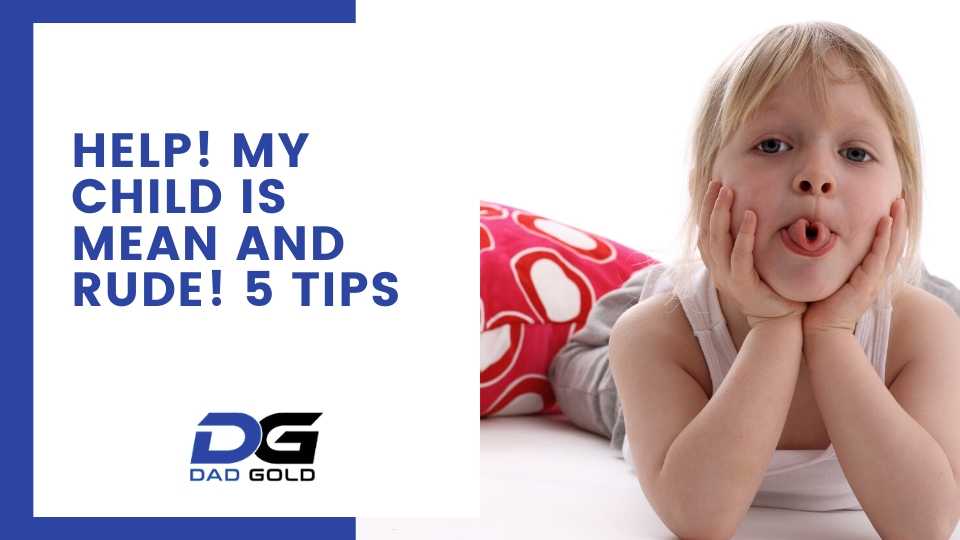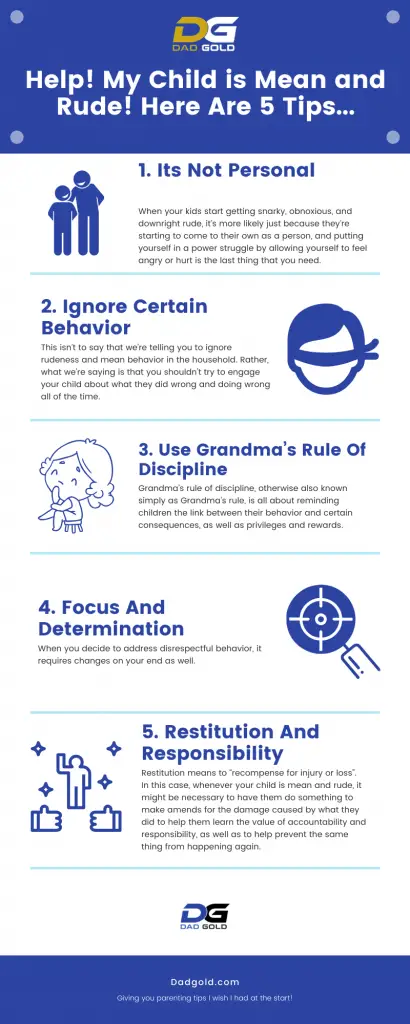It brings great shame to us to see our kids at their worst. This is especially true when other people, not just us parents, are negatively affected by what they did and what they’re doing. However, reacting to this situation by scolding and punishing them because you felt ashamed of how your children acted is not how to go about it.
This is because our kids need us to be the model example of how to be a better and bigger person during these times.
What you will learn in this post:
- Why you are screaming out, ‘help, my child is mean and rude!’
- 5 things you can do to stop this behavior.
The key to raising kind, compassionate, and selfless children is to act this way yourself!
You must remember that you are no less of a father because your kids act selfish, mean, and rude. You’re also not less of a father by choosing not to fight back when your children start misbehaving.
As heart-wrenching as these moments can be, these situations serve as a reminder that fatherhood is not about you but rather them.

My Child Is Mean And Rude! What Are The 5 Common Reasons?
Attention Seeking
This might sound cliche, but it’s true. Some children deliberately act mean and rudely to attract the attention from their parents. This is especially true for children whose fathers are not always at home. In such cases, they’ll be willing to go to extreme lengths just to get noticed, even if it means being punished for their behavior.
One of the best ways to deal with attention-seeking behavior is to ignore their tantrums and rudeness while focusing on their positive traits.
-

Bold Male Pride – Baseball Trucker Cap Celebrating Masculinity
£18.00 Select options This product has multiple variants. The options may be chosen on the product page -

Dad Bod Appreciation Gift Mug
£14.00 Add to cart -

Dad Bod, Bad Jokes Structured Baseball Cap
£22.00 Select options This product has multiple variants. The options may be chosen on the product page
They Are Learning
Children sometimes act out in frustration because they don’t know how to do something or what to do next.
When you notice your child misbehaving, don’t be quick to punish them. Instead, try to talk to them first and ask them why they misbehave.
Your child might be frustrated because they don’t know how to solve a particular problem or talk to other children. So you can take this chance to show them a more positive way of doing things.
No Emotional Control (Yet)
Children can be very emotional, making them easily feel happy and excited. It’s also relatively easy for them to be overwhelmed with anger, sadness, anxiety, and disappointment. As a result, they don’t know what to do when negative emotions overcome them.
They often act out when their emotions get the best of them.
For this reason, it’s essential to teach children that there are healthier ways of dealing with emotions and feelings so they can cope and deal with their feelings in a healthy manner instead of turning to mischief or, in worse cases, bottling up their emotions until it boils over.
Control
Deviant behavior is sometimes the result of a child’s attempt to gain some power and control for themselves.
Fighting back will only lead to a power struggle. The better alternative is to offer children two choices to feel like they have control over what’s happening and increase the likelihood of your child complying with your instructions while minimizing any chances of arguments.
It Has Worked Before
Sometimes, the answer to why your child is mean and rude is because they don’t just feel like it’s the best way to get what they want – it’s gotten them what they want before.
Many parents give in to whining, groaning, and temper tantrums to get their children to stop. However, you must remind your child that misbehavior will not serve them well as a father.
Otherwise, you’ll be teaching them that breaking the rules pays off.
My Child Is Mean And Rude! What Can I Do? Here Are 5 Top Tips.
Unfortunately, getting children back on track to grow up to become better individuals is much easier said than done.
So, how do you do it? Well, it’s not easy, but it pays to have help.
Here are 5 things that can help you better handle disrespectful and rude behavior as a father:

1. It’s Not Personal
When your kids start getting snarky, obnoxious, and downright rude, it’s more likely just because they’re starting to come to their own as a person, and putting themselves in a power struggle by allowing themselves to feel angry or hurt is the last thing that you need.
When your child inevitably starts pushing certain boundaries, telling them something as simple as, “Don’t behave like that. It’s not nice”, before turning around and walking away is an effective way of letting them know that they did something wrong while also preventing things from escalating further.
Be direct and clear. Do not let emotions get the best of you.
2. Ignore Certain Behavior
This isn’t to say that we’re telling you to ignore rudeness and mean behavior in the household. Rather, what we’re saying is that you shouldn’t try to engage your child about what they did wrong and to do wrong all of the time.
Eye-rolling is a widespread reaction among disrespectful children, and many fathers make the mistake of calling such behavior out as soon as they happen.
Doing this only makes things worse. Most of the time, it will only lead to a lengthy argument. The result? The two of you are left emotionally exhausted, with little to nothing getting done at the end of the day.
So, when your child rolls his or her ways or stomps their feet when they’re told to clean their room, just let them be.
At least, in the meantime.
For now, one thing that you can do is to warn them of the consequences of not doing their work.
Later on, when the two of you are calm, you can take the time to discuss with your child what happened. For example, you can ask them if they’re aware that they stomp their feet, grovel, roll their eyes, or slam doors, whenever they’re angry about something.
Sometimes, children don’t do disrespectful behavior on purpose, and other times, they do it subconsciously.
It is then up to you to let them know how you can see such behavior as disrespectful and the possible consequences of disrespect. Let them know what other people could feel if they see such behavior coming from them.
Let them know how they would feel if they witnessed such behavior in other people.
3. Use Grandma’s Rule Of Discipline
Grandma’s rule of discipline, known simply as Grandma’s rule, is all about reminding children of the link between their behavior and certain consequences, as well as privileges and rewards.
This means that, instead of outright pointing out negative behavior and consequences, it might be more effective to frame things as an incentive.
A good example is phrasing something like, “You’re not allowed to play video games unless you do your homework”, to, “You can go and play video games as soon as you’re done with your homework”.
It’s a simple shift in how you phrase things but can greatly affect how your child responds. This is because you teach your child that kind behavior yields a positive response.
4. Focus And Determination
When you decide to address disrespectful behavior, it requires changes on your end as well.
It’s not easy. It won’t be easy. It will test the very limits of your patience as a father. However, you should not waver. Not only is it rewarding to see your children’s behavior improve, but you might also learn a thing or two yourself.
5. Restitution And Responsibility
Restitution means “recompense for injury or loss.”
In this case, whenever your child is mean and rude, it might be necessary to have them do something to make amends for the damage caused by what they did to help them learn the value of accountability and responsibility, as well as to help prevent the same thing from happening again.
For example, if your child starts throwing away and breaking stuff because they’re angry, make them fix it, or better yet, get them to pay to fix it.
Teaching children that apologizing alone isn’t always enough will allow them to better reflect on the kind of behavior that resulted in such a situation while also allowing them to work on repairing broken relationships with other people, you included.
Discuss consequences with them, before and after!
Conclusion
If you are screaming out, ‘my child is mean and rude, please help!’ then my 5 top tips on this page will help you out!
Children aren’t the most consistent creatures.
One day, your child may be the loving and kind prince and princess you raised him or her to be. Other days, they might struggle to be kind and compassionate. The days where they are the latter can make you feel like you have failed your job as a father.
Do not let it get to you.
Remember that you can’t make significant progress in just a single day. Instead, it takes consistent work and discipline.
During the days when your child is good, don’t forget to remind them that they’re doing good and making you proud. On the other hand, when they become disrespectful little imps, consider extending your patience a little bit and try to remember why you’re doing what you’re doing in the first place.
Also, don’t forget that you are their role model.
Whatever you do and however you react to certain situations, they’ll try to pattern their behavior. For example, if you want to raise your kids to be kind and compassionate adults, you will do very well to model the behavior you want to see from them.
Good luck!





